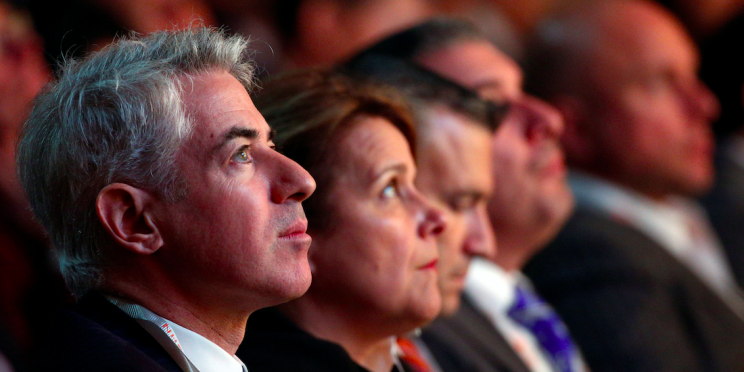Hedge fund giant Bill Ackman just took a massive blow

Shares of multi-level marketer Herbalife jumped on Friday following a report from The Wall Street Journal that The Federal Trade Commission will not determine the company to be a pyramid scheme. Instead, the company will pay a $200 million fine and have to improve disclosures about its distributors, the report said. The story was later confirmed.
Initially, shares of Herbalife (HLF) had spiked more than 16% in the pre-market, hitting the $68 range. Those gains have since subsided a bit. The stock was last trading up about 9% at $65.
It’s bad news for hedge fund titan Bill Ackman.
For more than three years, Ackman, the founder of $12 billion Pershing Square Capital Management, has been crusading against the seller of weight-loss and nutritional shakes. In late December 2012, Ackman, who first shorted the stock in the mid-$40 range, publicly declared that he was short $1 billion worth of Herbalife and that the stock would go to $0.
Ackman’s thesis centered around his belief that the company is operating as a “pyramid scheme” that targets poor people, particularly from minority populations. .His investment was also predicated on regulators, specifically the FTC, shutting the company down.
Herbalife has always denied Ackman’s allegations.
The FTC didn’t shut Herbalife down, but the company will have to change the way it does its business, particularly when it comes to recruiting distributors.
“This settlement will require Herbalife to fundamentally restructure its business so that participants are rewarded for what they sell, not how many people they recruit,” FTC Chairwoman Ramirez said in a statement. “Herbalife is going to have to start operating legitimately, making only truthful claims about how much money its members are likely to make, and it will have to compensate consumers for the losses they have suffered as a result of what we charge are unfair and deceptive practices.”
The FTC also found that claims that people can become Herbalife distributors and make thousands of dollars a month or get rich are false.
“But the truth, as alleged in the FTC complaint, is that the overwhelming majority of distributors who pursue the business opportunity earn little or no money,” the FTC statement said.
A number of hedge funds, most notably Carl Icahn, have disagreed with Ackman’s thesis and piled on by going long the stock.
On the news of the settlement, Icahn said that the board has increased his ownership from 25% to 34.99% of the company’s outstanding shares. He also went on to criticize the short-sellers.
“A significant part of my investment success is directly tied to our in-depth investment research and understanding of often complex and unique issues facing companies. One can be sure that this was the case with Herbalife where we spent considerable time and resources studying the false pyramid scheme accusations made against the Company. Unlike many of those that ‘shorted’ Herbalife, we did not rely on one or two research papers prepared by non-experts,” Icahn wrote.
Icahn’s comments seem to be a reference to how Ackman got the Herbalife idea. It was a former Bloomberg News reporter-turned-researcher, Christine Richard, who gave Ackman the idea. Richard wrote the book “Confidence Game” that chronicles Ackman’s famed MBIA short.
The FTC opened an investigation into the company in March 2014. The company said in May that it was in “advanced” stages of reaching a settlement. The company expected that the fine would be $200 million.
Shortly after, Ackman wrote in his fund’s first quarter shareholder letter that a $200 million settlement would be “immaterial to Herbalife” even though it’s one of the highest ever in an FTC consumer protection action.
On Thursday, Ackman told CNBC’s “Halftime Report” that he was still short Herbalife.
Over the last three years, he’s lost an estimated hundreds of millions of dollars on the bet.
Pershing Square International was last down 15.3% through July 12, according to data compiled by HSBC. Meanwhile, Pershing Square Holdings, the fund’s publicly traded vehicle, was last down 19.1% through the same time period.
A representative for Pershing Square did not comment.
—
Julia La Roche is a finance reporter at Yahoo Finance.
Read more:
Billionaire Rubenstein: These 6 traits will help you succeed on Wall Street
How a $650,100 lunch with Warren Buffett changed one hedge fund manager’s life
Warren Buffett once said these are 2 of the more important decisions you’ll make in life
Buffett: Your business will succeed if you execute this 3-word mission
A hedge fund manager gave some blunt advice to a bunch of 9th grade boys

 Yahoo Finance
Yahoo Finance 